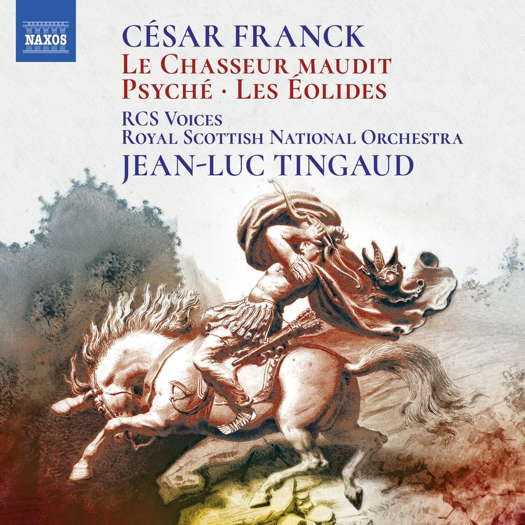 DISCUSSION: What is a work? John Dante Prevedini leads a discussion about The performing artist as co-creator, including contributions from Halida Dinova, Yekaterina Lebedeva, Béla Hartmann, David Arditti and Stephen Francis Vasta.
DISCUSSION: What is a work? John Dante Prevedini leads a discussion about The performing artist as co-creator, including contributions from Halida Dinova, Yekaterina Lebedeva, Béla Hartmann, David Arditti and Stephen Francis Vasta.

Enticing Orchestration
GERALD FENECH listens to tone poems
by César Franck performed by the
Royal Scottish National Orchestra
and conductor Jean-Luc Tingaud
'Absolute loveliness performed with an unbridled radiance of spirit supplemented by some gorgeous playing.'
Although César Franck (1822-1890) was born in Belgium he was always considered to be French. The reason is that, for practically all of his life, his musical activities constantly evolved in Paris. He was a child prodigy and entered the Liège Conservatory when only eight. His progress as a pianist was so impressive that in 1834 his father took him on tour and, a year later, sent him to Paris where he worked with the famous Bohemian composer Anton Reicha. In 1837, aged fifteen, Franck entered the Paris Conservatoire. Within a year he had garnered the Grand Prix d'Honneur followed by first prize for fugue and second prize for organ. To please his father and earn some much needed money Franck gave concerts of his own virtuosic fantasies and operatic potpourris which at the time were much loved by audiences of all ages.
After 1840 Franck's compositions became more serious, and for the rest of his life he earned his livelihood as a teacher and organist, leading a simple, almost ascetic, existence. In 1872 the composer was appointed organ professor at the Paris Conservatoire, and his efforts to give French music that emotional engagement and technical solidity comparable to that of German composers was rewarded by the admiration of such names as Vincent d'Indy and Ernest Chausson. Indeed, this devotion led these composers to call him 'Papa Franck'. Sadly, his genius was not recognised by other famous composers, and while at the Conservatoire he attracted intense opposition from none other than Camille Saint-Saëns. Franck's music was mostly unsuccessful in his lifetime, and only in the last decade of his career did recognition arrive, albeit with a certain modest dose.
This exciting release of Franck's three most impressive tone poems offers arguably one of the most attractive modern options for collectors. Les Éolides (The Breezes) dates from 1875 and narrates, over a ten-minute span, the activities of the daughters of Aeolus, the Greek God of the Winds, as they awaken nature with their songs. The piece is the most Wagnerian of the three and Franck conjures up some truly delightful sounds, full of serene and at times enticing orchestration.
Listen — Franck: Les Éolides
(track 10, 0:00-1:00) © 2020 Naxos Rights (Europe) Ltd :
Le Chasseur Maudit (The Accursed Hunter) of 1882 is undoubtedly the composer's most sheerly brilliant orchestral piece and tells the horror-tale of a Count who flouts the Lord's Day by going on a violent hunting spree. For this transgression he is not only sent to Hell but also condemned to keep hunting for eternity. Franck's vivid imagery describing the Count's wild orgy is, maybe, one of the most hair-raising symphonic passages in all of Franck's Romanticism.
Listen — Franck: Le Chasseur Maudit
(track 1, 12:52-13:52) © 2020 Naxos Rights (Europe) Ltd :
Psyché was composed three years before Franck's death and has a chorus - RCS Voices - at the centre of its story which expresses the power of love between Psyché and Eros in dreams and a passionate union. In this 47-minute work the composer attained something that many others attempted but often failed, that of capturing the magical beauty of love in song. Indeed, those angelic voices convey that intoxicating feeling of falling in love with an overpowering seductiveness that makes you close your eyes and pause to take a surprised breath.
Listen — Franck: Eros a pardonné (Psyché)
(track 9, 1:00-1:55) © 2020 Naxos Rights (Europe) Ltd :
Absolute loveliness performed with an unbridled radiance of spirit supplemented by some gorgeous playing.
Copyright © 15 July 2020
Gerald Fenech,
Gzira, Malta

CD INFORMATION - FRANCK: PSYCHÉ; LE CHASSEUR MAUDIT; LES ÉOLIDES



